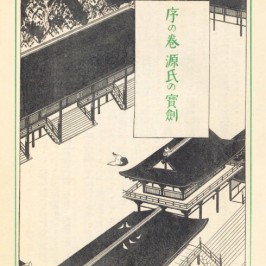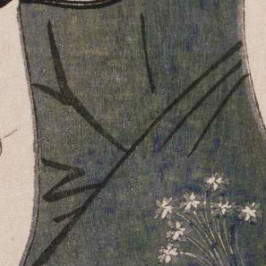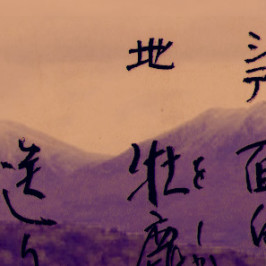The research for the sort of novels I write (which for want of a better term I call historical fantasy) is rather a mysterious process, even to me. I read very widely, travel in Japan as much as I can, (preferably wandering around on foot on my own, absorbing landscape, seasons, light and shadows, trees, flowers, birds and other wildlife) and spend a lot of time looking at old buildings and art, museums and galleries. I make a lot of notes, but always what I am unconsciously looking for are those little nuggets of gold that will bring my story to life and make it shimmer. I steal these from many sources and often don’t have to write them down.
A novel comes from the vast spaces of the subconscious mind with its profound capacity to produce images of great significance and stories of mythic resonance, somehow controlled and shaped by reason. Writing is constantly balancing the two. I like to write very early in the morning, starting before dawn, when no one else is awake, including my rational mind. I write by hand: the effort and pace seem to honour the creative process. What I have read, seen, heard, reflected on, surfaces but often in a rather confused way, even to me. It’s usually only after many drafts that I realise the meaning of a particular scene or character or image and why it appeared when it did. It’s a time consuming, even wasteful, way to write, I suppose, – I had the first idea for The Tale of Shikanoko over five years ago – but I console myself by thinking about how nature creates in the same profligate way.
These are some of the books I have found inspiring.
Thomas Conlon :: State of War
Karl Friday :: Samurai, Warfare and the State in Early Modern Japan
Andrew Goble :: Confluences of Medicine in Medieval Japan
Janet Goodwin :: Selling Songs and Smiles
Elizabeth Oyler :: Swords, Oaths and Prophetic Visions
Mikael S Adolphson :: The Teeth and Claws of the Buddha
Pierre Francois Souyri :: The World Turned Upside Down
Rachel Poliquin :: The Breathless Zoo
Natsuo Kirino :: The Goddess Chronicle
The Tale of the Heike :: trans Royall Tyler
The Tale of the Soga Brothers :: trans Thomas J Cogan
The Demon’s Sermon on the Martial Arts :: Issai Chozanshi trans William Scott Wilson






10 Responses
Tessa Strickland
Thank you for describing your writing process and for the way you compare it to the profligate processes of nature. I too write by hand, believing that there is a connection between head, heart and hand that is best served by writing in this way. I have read and re-read Tales of the Otori several times and cherish all of them. It is a long time since I lived in Japan but your stories vividly evoke its land and its people for me as well as resonating at a deeper and more archetypal level. It seems to me that by bringing so much careful and loving attention to the Japan you explore, you do the same for all humanity, speaking to why it matters that we continue to work towards justice and peace, across centuries and continents.
Lian Hearn
Hi Tessa, thanks for the lovely comment. I’ve always thought that careful and loving attention is one of the most important things I’ve learned from Japanese culture. ‘If you pay attention you will understand’, is a line from Hiroshima Mon Amour, a film I saw when I was about 17 (am writing a blog post on it), which was one of the things that sparked my interest in Japan. Good to be in touch.
Gabrielle Oldmeadow
Tales of the Otori have all the elements of great storytelling, a perfect balance between plot and character and an engaging pace that manages exhilaration and contemplation so artfully. Enshrined in all the iconography of Medieval Japanese culture there is nothing not to like. Heartfelt gratitude for this literary gem. Beautiful, loved it! Thank you Lian.
Lian Hearn
Thank you very much – such a lovely comment.
» The Art of Unpredictable & Unclassifiable Literature: Writers Discuss Lian Hearn’s Fantasy Epic The Tale of Shikanoko
[…] This doesn’t exactly address Toby’s question, but Lian Hearn does say a bit about her process here. And elsewhere she’s said that she immerses herself very deeply in research and then tries to […]
Enoch
I’ve read the German Translation of Tales of Otori (Der Clan der Otori) and it’s been my favourite ever since.
Great to hear you’re still at it. (Writing :D)
It has been too long since i read a Book but I am looking forward in reading this Tale of Shikanoko in the Future.
And I’ve been thinking if you got your Inspiration for your pseudonym from Lafcadio Hearn and figured Lian came from Gillian.
But could you tell me please what your original thoughts were when thinking of the pseudonym?
I’m just a curious Fan.
Greets&Love from Frankfurt <3
Lian Hearn
Thanks so much for your message. I hope you enjoy Shikanoko too. You are right about the pseudonym – Lian comes from Gillian and I chose Hearn because it means heron in old English, as well as being a kind of homage to Lafcadio Hearn whom I greatly admired for his ability to slip into Japanese society, unlike so many Europeans in the 19th century who remained outsiders. And I love his writings about Japan.
makela
I own the first two volumes of The tales of Shikanoko in French and they are amazing! I read a lot of fantasy books and I’ve always been interested in medieval history and Japan’s culture. This series has all of that and I cant wait to finish it!
Lian Hearn
Hi Makela, thanks for your message. I hope you enjoy the next books too.
The Art of Unpredictable & Unclassifiable Literature – Electric Lit
[…] This doesn’t exactly address Toby’s question, but Lian Hearn does say a bit about her process here. And elsewhere she’s said that she immerses herself very deeply in research and then tries to […]